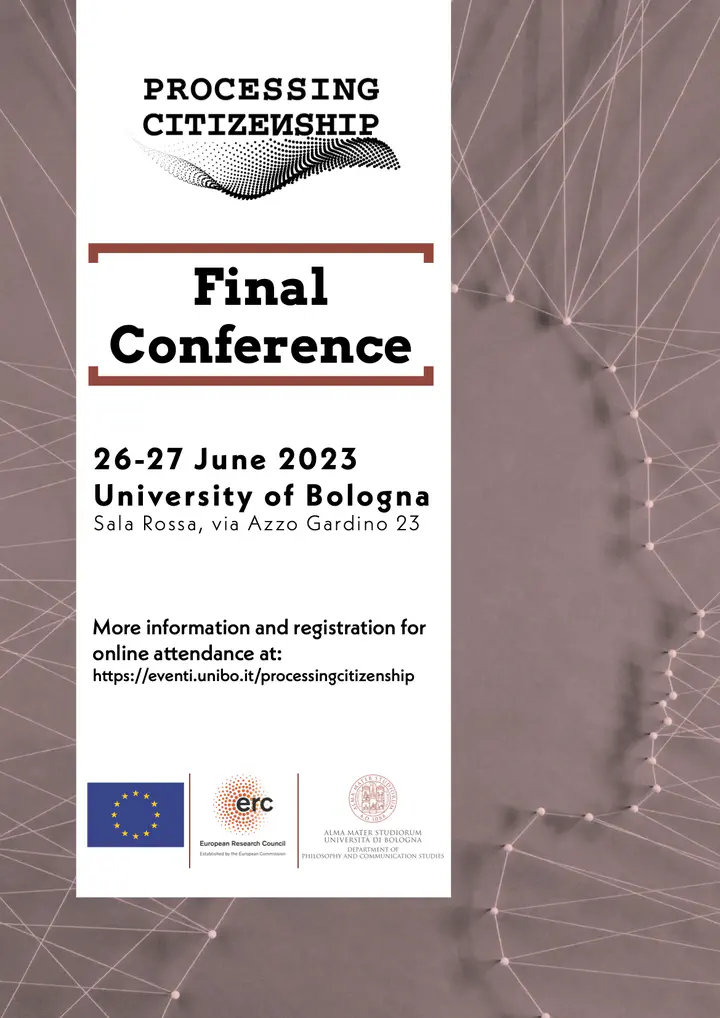Panel 'Management of identities in transnational, supranational, and commercial reconfigurations'

The panel presenters were:
- Wouter Van Rossem: Tracing the evolution of an identification software: An exploration of gateway technology in data infrastructure for border security and migration control
- Matthias Leese: What counts as intelligence? The politics of data quality in EU internal security
- Nina Dewi Toft Djanegara: Ghosts in the machine
- Roelof Troost: Passenger screening: ensuring accurate identity resolution & watch list matching
Panel Discussants:
- Lucy Suchman
- Stefan Kuhlmann
Panel design by Wouter Van Rossem and Chaired by Lorenzo Olivieri.
Abstract
This panel aims to explore how transnational, supranational, and commercial contexts reconfigure knowledge production and the management of identity data of people on the move. It is common to associate the identification and registration of people on the move with nation-state-building initiatives that aim to distinguish between citizens and non-citizens by establishing identity registers. Only recently have scholars begun to pay attention to transnational identification and registration practices (About et al., 2013). This is also one of the founding intuitions of the Processing Citizenship project. How should we, for instance, make sense of the responsibilities of organizations like the European Commission agencies, the United Nations High Commissioner for Refugees, the International Organization for Migration, Interpol, the International Civil Aviation Organization, or ISO when it comes to rationalizing and standardizing identity management and identification systems?
The goal of the panel is to look into how a more trans- and supra-national heuristic perspective can highlight the role of private and commercial actors in the transformation of identity management and identification. Scholars have demonstrated, for instance, that only a handful of globally operating corporations have developed EU migration governance (Lemberg-Pedersen at al., 2020). How can we make sense of the ways in which these actors reshape identity management and, by extension, the creation of knowledge and non-knowledge about people on the move? How do these professionals navigate the conflicts that arise when applying internationally honed technologies to local settings? How can they develop responsible innovation in providing sensitive sociotechnical infrastructures that have long-term impact on people’s lives?
Notably, the panel adopts an overtly material perspective. It proposes to examine how novel forms of identification, such as interoperability and linking and cross-checking personal data from various national and international databases, are made possible, and with which governance and political implications. In practice, making people legible through data practices can never be completely accurate. Practitioners need to be flexible and able to adapt to unforeseen circumstances, such as taking fingerprints in unfavourable weather or dealing with names that cannot be transliterated without ambiguity. Taking a cue from the materiality debate in CSS, STS and beyond, we can inquire as to whether or not the practices and infrastructures of identification in international contexts also constitute the meanings of (in)security.
References
- About, Ilsen, James Brown, and Gayle Lonergan, eds. Identification and Registration Practices in Transnational Perspective. London: Palgrave Macmillan UK, 2013. DOI: 10.1057/9781137367310.
- Lemberg-Pedersen, Martin, Johanne Rübner Hansen, and Oliver Joel Halpern. The Political Economy of Entry Governance. Copenhagen: Aalborg University, 2020.